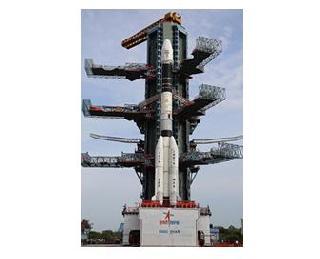
The Ariane 5 rocket with the GSAT-7 and EUTELSAT 25B/Es'hail 1 payloads approaches the launch pad at Europe's Spaceport in French Guiana. An Arianespace photo
BANGALORE (PTI): India's maritime security will get a fresh impetus as the stage is now set for the launch of an exclusive home-built satellite for the Navy by European space consortium Arianespace from Kourou spaceport in French Guiana on Friday.
The GSAT-7 is India's first dedicated spacecraft for defence applications.
"It has frequency bands that will help marine communications", an official of Bangalore-headquartered Indian Space Research Organisation, which built the satellite, told PTI here.
"It has coverage over India landmass as well as surrounding seas. It's important from security and surveillance points of view", the official said on condition of anonymity.
A senior space scientist in the know said: "So far, Navy had limitation from line of sight and ionospheric effects etc.
It was thought essential to have an integrated platform for their exclusive use. Earlier, satellite communication in ships was through Inmarsat (a major provider of global mobile satellite communications services). Now, India will have its own set up."
ISRO shies away from calling it an exclusive satellite for the Navy on record, but privately admits exactly that.
The Rs 185 crore state-of-the-art satellite carries payloads operating in UHF, S, C and Ku bands.
The GSAT-7 has a lift-off mass of 2,625 kg and is based on ISRO's 2500 kg satellite bus with some new technological elements, including the antennae. Its solar arrays generate 2900 W of electrical power.
The A108 Ampere-Hour Lithium-Ion battery enables the satellite to function during the eclipse period. The propulsion subsystem has a 440 Newton Liquid Apogee Motor (LAM) and thrusters.
The GSAT-7 is scheduled to be launched into a Geosynchronous Transfer Orbit (GTO) by Ariane-5 VA 215 during the 50-minute launch window starting from 1400 IST on Friday.
The launch cost for ISRO is around Rs 470 crore, including insurance. ISRO can't launch heavy satellites like GSAT-7 as its home-grown GSLV rocket, with indigenous cryogenic stage, is still at works and needs two successful flights before it's declared operational.
 Previous Article
Previous Article Next Article
Next Article










The Indian Air Force, in its flight trials evaluation report submitted before the Defence Ministry l..
view articleAn insight into the Medium Multi-Role Combat Aircraft competition...
view articleSky enthusiasts can now spot the International Space Station (ISS) commanded by Indian-American astr..
view article